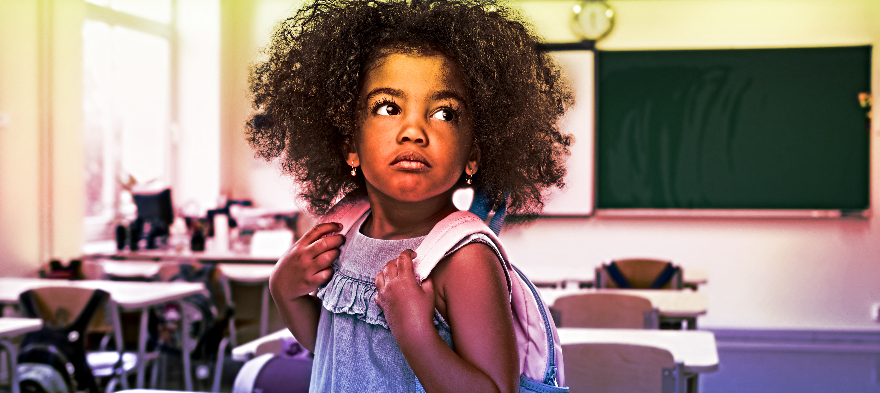
Nov 3, 2021 12:00:00 AM
On the last day of third grade, all my classmates and I huddled onto a carpet much too small for children of our size, waiting for our teachers for the next year to be announced. There was an obvious consensus about the best teacher. Students screeched in excitement when they saw their name on Mr. R’s classroom roster or slouched their shoulders in disappointment if they saw their names elsewhere. My best friend and I found our names on Mr. R’s roster. That was the only confirmation I needed. Fourth grade would be the best year ever.
Just as I expected, it was true. Mr. R was spontaneous, loud, and an excellent storyteller. Our class would often get sidetracked from our lesson to listen to Mr. R’s stories of hunting in the forests of Maine or wrestling gators in the marshes of Florida. [pullquote]There was nothing our 70-year old-teacher hadn’t experienced. Except, that is, teaching a child like me.[/pullquote]
I was one of the only Black students in my elementary school, and the only one in Mr. R’s class. Standardized tests proved I was in the top percentile for reading in my age group and I was meeting all my math expectations. Regardless of my test scores, I still remained at one of the lowest-level reading groups in my fourth grade class. Mr. R set lower expectations for me. When I was nine, I did not think Mr. R held biases against me. I was only confused. I hoped he would see my test scores and put me in a higher-level group. He never did. I’m now 17 years old, and kids like me are still subject to this unfair treatment.
I tell this story because I want to speak directly to people in my community, my state, and my nation who are currently opposing efforts to make schools more anti-racist institutions. The opposition to implicit bias and equity training in schools, a direct result of the critical race theory hysteria earlier this spring, only pushes our nation further back. [pullquote]Efforts to address racism in the classroom — and in education institutions more broadly — would have made life better for me as a young Black student.[/pullquote]
American public schools are plagued by racist practices, and the persistent underestimation of Black and brown students like me is just one example. A study done by the U.S Department of Education for Civil Rights in 2014 noted that “White and Asian-American students make up 70% of the students enrolled in gifted and talented education programs” compared to Black and Latino students, who made up only 26%. The underestimation of Black and Latino students does not stop in elementary school, but rather manifests into denying those same students enrollment into honors and AP courses. Implicit bias rooted in racism is the sole reason that those students are underrepresented in AP courses but overrepresented in suspensions, detentions, and expulsions.
In 2016, 97% of teachers agreed that equity training should be a priority nationwide, however, right now it seems there is nothing more controversial than Black and brown students wanting fair treatment and representation. The anti-racist, equity, and implicit bias training in various school districts help to curb unequal practices that prevent Black and Latino students from accessing challenging courses. [pullquote position="right"]Efforts to push schools away from equity and implicit bias training only do harm.[/pullquote]
Supporters of the anti-critical race theory movement claim that equity training for teachers “judges people NOT by the content of their character, but by the color of their skin.” However, equity training for teachers in my school district and others exists only to do the opposite of what the anti-critical race theory camp thinks: to make schools a more fair place to learn regardless of race, ethnicity, or gender and to correct the ills that the American education system has committed for centuries.
When I think back to my elementary school education, my most vivid memories are microaggressions from my teachers commenting on my hair or my proficiency in English as the daughter of immigrants. I think back to how much harm was done to my confidence because of my teachers’ explicit and implicit biases. I wonder how much more I would have enjoyed school as a Black young girl if the administration had prioritized equity training. I’m afraid of how many more Black young boys and girls are convinced they are stupid by those who are supposed to educate them.
Balqies Mohamed is a senior attending high school in Maine. She is involved with the organization Portland Empowered as a Youth Engagement Partner.
The story you tell yourself about your own math ability tends to become true. This isn’t some Oprah aphorism about attracting what you want from the universe. Well, I guess it kind of is, but...
If you have a child with disabilities, you’re not alone: According to the latest data, over 7 million American schoolchildren — 14% of all students ages 3-21 — are classified as eligible for special...
The fight for educational equity has never been just about schools. The real North Star for this work is providing opportunities for each child to thrive into adulthood. This means that our advocacy...
Your donations support the voices who challenge decision makers to provide the learning opportunities all children need to thrive.
Ed Post is the flagship website platform of brightbeam, a 501(c3) network of education activists and influencers demanding a better education and a brighter future for every child.
© 2020–2024 brightbeam. All rights reserved.
Leave a Comment